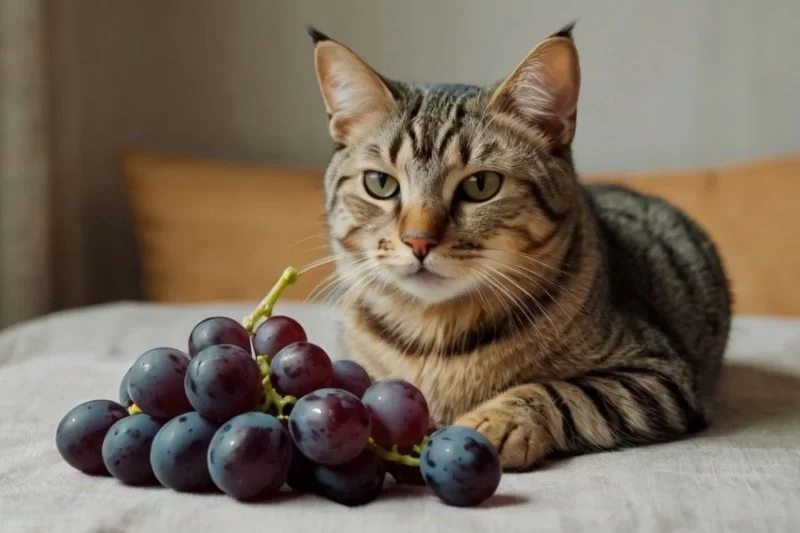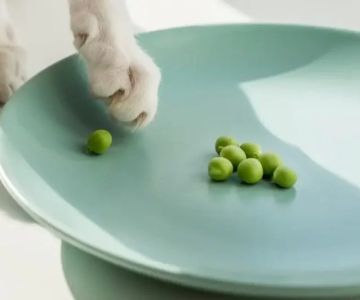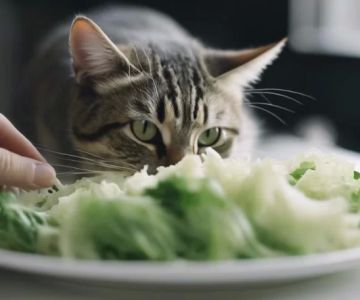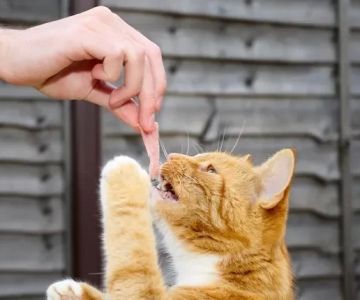1. Can Cats Eat Grapes or Raisins? The Dangerous Truth
Many pet owners are unaware of the danger that seemingly harmless snacks like grapes and raisins can pose to cats. While these fruits are safe for humans and some animals, cats react very differently. If you're wondering, can cats eat grapes or raisins? The simple and unfortunate answer is no—grapes and raisins can be toxic to cats and should never be given to them.
1.1 Why Are Grapes and Raisins Toxic to Cats?
The exact compound in grapes and raisins that causes toxicity in cats is still not fully understood, but the effects can be severe. Even small amounts can lead to kidney failure, which can be fatal if not treated promptly. The toxicity is believed to be related to a substance in the fruit, but because not all cats are affected in the same way, it's important to avoid taking any chances. There have been documented cases where cats consumed grapes or raisins and experienced adverse reactions, even when the amount ingested seemed small.
2. Symptoms of Poisoning from Grapes or Raisins
If your cat has ingested grapes or raisins, it's essential to monitor them closely for signs of toxicity. Symptoms can appear within hours of consumption, and the severity can vary. The following are common signs of poisoning:
2.1 Early Symptoms of Grape or Raisin Poisoning
- Vomiting
- Loss of appetite
- Lethargy or weakness
- Diarrhea
These initial symptoms are often the first indication that something is wrong. It's important to act quickly if you notice any of these signs.
2.2 Serious Symptoms and Complications
- Abnormal or decreased urination
- Kidney failure (which can be life-threatening)
- Severe dehydration
- Seizures (in extreme cases)
If your cat shows signs of kidney failure, it is a medical emergency. Immediate veterinary care is required to prevent long-term damage or death.
3. What to Do if Your Cat Eats Grapes or Raisins
If you suspect that your cat has eaten grapes or raisins, it's critical to act quickly. The sooner you can get your cat to a veterinarian, the better their chances of recovery.
3.1 Contact Your Veterinarian
As soon as you realize your cat has ingested grapes or raisins, contact your veterinarian or an emergency animal clinic. They can assess the situation and determine the best course of action, which may involve inducing vomiting or administering activated charcoal to prevent further absorption of toxins.
3.2 Inducing Vomiting
If your veterinarian advises it, they may induce vomiting to help your cat expel the toxins. This is most effective when done within two hours of ingestion. However, inducing vomiting at home is not recommended unless specifically instructed by a professional, as it can be harmful if not done properly.
3.3 Hospitalization and Treatment
In some cases, your cat may need to be hospitalized for IV fluids and supportive care to help protect their kidneys and restore hydration. This treatment can prevent or mitigate the effects of kidney failure if done promptly. If kidney damage is detected, your cat may require ongoing treatment and monitoring.
4. Preventing Grape and Raisin Poisoning
Prevention is always the best strategy when it comes to keeping your cat safe. Here are some steps you can take:
4.1 Keep Grapes and Raisins Out of Reach
Always store grapes, raisins, and foods containing them in places that are inaccessible to your cat. Even small amounts can be dangerous, so it’s essential to keep these foods out of your pet’s reach.
4.2 Educate Your Family and Visitors
Make sure everyone in your household knows that grapes and raisins are toxic to cats. Visitors and children may not be aware of the dangers, so it's important to communicate this information clearly to avoid any accidental ingestion.
4.3 Provide Safe Snacks for Cats
If you're looking for safe and healthy treats for your cat, consider alternatives like catnip, cat treats, or specially formulated pet-friendly snacks. These options are designed to satisfy your cat’s taste buds without posing any risks to their health.
5. Conclusion: Stay Vigilant About Your Cat's Diet
In conclusion, can cats eat grapes or raisins? No, it’s important to keep these fruits away from your cat. Even though they may seem harmless, grapes and raisins can cause severe harm, including kidney failure. If your cat accidentally ingests them, prompt action is crucial. Always seek veterinary care immediately if you suspect poisoning.
By staying vigilant about the foods you allow your cat to consume, you can ensure their safety and well-being. For expert advice and high-quality pet care products, visit Hidden Brook Veterinary for trusted resources and services.












